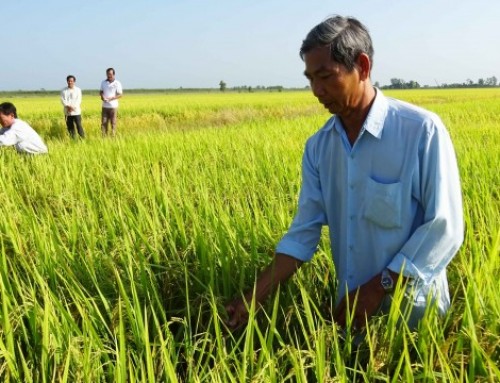From organic farmers to organic customers

Recently opened in Phnom Penh, the Eco-Agri Center provides complete services to link organic farmers to markets. The centre is connecting networks of biological input suppliers, knowledges, practitioners, farmers, and markets in order to fill the gap in the organic value chain needed to promote organic products. It trains farmers on organic farming at no cost, supply chemical-free products to eco-friendly production, and create market channels for healthy products.
 “I did not know much about organic food and where to buy it. So I had been eaten vegetables from conventional markets which, normally, contained high levels of chemical. It had indeed affected my health badly, and I went to health check-ups two to three times per week sometimes because I felt very weak,” said Ms. S. Chan Ut, 29, who works at an organic farm in Chroy Svay Village, Koh Kong Province, Cambodia.
“I did not know much about organic food and where to buy it. So I had been eaten vegetables from conventional markets which, normally, contained high levels of chemical. It had indeed affected my health badly, and I went to health check-ups two to three times per week sometimes because I felt very weak,” said Ms. S. Chan Ut, 29, who works at an organic farm in Chroy Svay Village, Koh Kong Province, Cambodia.
“Now that I work at the organic farm, I do not have those health problems anymore, and I learn about organic farming techniques which I can apply on my family organic farm directly.”
Agriculture is one of the cornerstones of Cambodia’s economy. Almost a third of the land area in Cambodia is dedicated to agricultural activities. Slightly more than half of the country’s population is employed in the agricultural sector which generates 33.5 percent of the overall GDP (World Bank, 2013). Despite crop production nearly doubling since 2006 and an overall increasing food production, the sector still faces a number of severe challenges. One of them is low-quality products and even fertilizers with toxic ingredients inundate the Cambodian market due to the absence of unified standards and weak control mechanisms of agri-inputs.
The Eco-Agri Center is a joint initiative of GIZ Cambodia (through ASEAN Sustainable Agrifood Systems–ASEAN SAS), and the Khmer Organic Cooperative. ASEAN SAS is a regional project that operates under the German-ASEAN Program on Response to Climate Change (GAP-CC). The overall objective of the project is to develop regionally coordinated policies and strategies addressing sustainable agriculture and food production and food security, and to strengthen sustainable agrifood systems.
By Yotsawin Kukeawkasem and Rojana Manowalailao, ASEAN Sustainable Agrifood Systems





